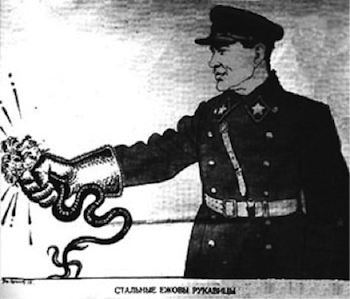

|
Explaining the Great Terror  Yezhov's grip on 'enemies of the people' The thinking behind these mass repressions is suggested in the stenographic record of the Central Committee Plenum of February-March 1937. Stalin was afraid of an approaching war - the military aggression of Nazi Germany signalled by its occupation of the Rhineland in 1936 and the occupation of Manchuria by the Japanese convinced him that the USSR was threatened by the Axis powers on two fronts - and he wanted to eliminate 'anti-Soviet elements' that could become a 'fifth column'. Like all the Bolsheviks, Stalin was acutely conscious of war's revolutionary potential. In 1917 they had come to power by exploiting Russia's military weaknesses. The rationale of insuring against a 'fifth column' was advanced by Molotov several decades later in a conversation with Felix Chuev: Nineteen thirty-seven was necessary. If you consider that after the revolution we were slashing left and right, and we were victorious, but enemies of different sorts remained, and in the face of impending danger of fascist aggression they might unite. We owe the fact that we did not have a fifth column during the war to '37. After all, even among Bolsheviks there were the sorts who were fi ne and loyal when everything was going well...But if something started, they would falter and switch sides. Stalin's fear of a fifth column is shown by notes he made in 1937 that Trotsky's supporters in the USSR would 'save their strength for the beginning of a war'. In a speech to the February-March Plenum he added this idea: 'To win a battle in wartime several corps of soldiers are needed. And to subvert this victory on the front, all that is needed are a few spies somewhere in army headquarters'. On this reasoning, Stalin was prepared to arrest thousands to catch just one spy. As he said, if just 5 per cent of those arrested turned out to be truly enemies, 'that would be a good result.' According to Khrushchev, then the head of the Moscow Party Committee, Stalin 'used to say that if a report [denunciation] was ten per cent true, we should regard the entire report as fact.' Everybody in the NKVD knew that holding back from their quota of arrests would get them into trouble for lack of vigilance. 'Better too much than not enough,' Yezhov warned his operatives. If 'an extra thousand people are shot, that is not such a big deal.' |
© 2014 Orlando Figes | All Rights Reserved